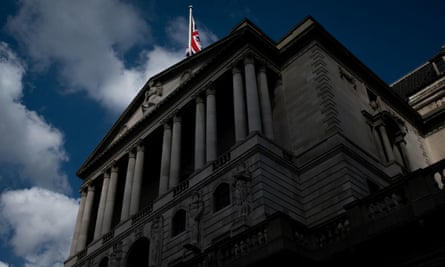
Rishi Sunak’s pledge to ease the cost of living crisis is in tatters after the Bank of England was forced to raise interest rates to 5% in an inflation-busting move that risks driving the economy into recession.
With the prime minister under fire over the soaring cost of borrowing, the central bank pushed through a half-point hike, deploying what economists described as “shock and awe” tactics.
Mortgage holders are bracing for more pain, with rates now at their highest level since the 2008 financial crisis, and markets betting on a further rise to 6% by Christmas.
The prime minister said he supported the Bank’s move, despite warnings that the economy may have to be pushed into recession in order to tame the steepest price rises in the G7.
Speaking on a visit to an Ikea distribution centre in Kent after the Bank’s decision, Sunak sought to reassure workers by arguing he was “totally, 100% on it” in his central mission to ease the pressure on living costs.
“It is going to be OK and we are going to get through this and that is the most important thing I wanted to let you know today,” he said.
He repeated a promise to halve the rate of inflation by the end of the year, but said it had “clearly got harder” to meet the pledge and admitted the chances of doing so were diminishing.
Joe Nellis, a professor of global economy at Cranfield School of Management, said: “The Bank of England is deploying shock and awe tactics in a bid to shake the economy out of its current state of inflation. Inflation is becoming embedded in the system with little sign of it subsiding. Unfortunately, further financial hardship is expected for many millions of households – and those at the lower end of the income scale with variable rate mortgages, or who are in the process of remortgaging, will be hit the hardest.”
 View image in fullscreenSome Conservatives have accused the Bank of England of being ‘asleep at the wheel’. Photograph: Aaron Chown/PA
View image in fullscreenSome Conservatives have accused the Bank of England of being ‘asleep at the wheel’. Photograph: Aaron Chown/PA
Figures on Wednesday showed inflation remained unchanged at 8.7% in May, driving expectations that the central bank would have no choice but to respond. Inflation had been expected to fall to 8.4%, still well above the Bank’s 2% target.
Markets are forecasting that the Bank will have to keep its base rate above 6% from December until June next year, piling pressure on borrowers in the run-up to the next general election.
“We think this will trigger a recession in the UK and we believe that’s what is required to reduce inflation,” said Ruth Gregory, the deputy chief UK economist at the consultancy Capital Economics.
Andrew Bailey, the Bank’s governor, said he was “not desiring a recession” but warned that the central bank would “do what is necessary to bring inflation down to target”.
Warning of far-reaching consequences for the economy and for society at large, the National Institute of Economics and Social Research said as many as 1.2m households would become in effect “insolvent” as higher mortgage costs sap their financial headroom and leave their outgoings equal to their income.
The shadow chancellor, Rachel Reeves, said the government was failing to tackle inflation despite Sunak’s promise to halve it. “This Tory government can’t get a grip of this problem because they are the problem – 13 years of the Tories and their disastrous mini-budget are damaging our economic security and leaving families worse off,” she said.
With the government under growing pressure to intervene to help households, the chancellor, Jeremy Hunt, is due to hold meetings in Downing Street with Britain’s biggest high street banks on Friday.
skip past newsletter promotion
Sign up to First Edition
Free daily newsletter
Our morning email breaks down the key stories of the day, telling you what’s happening and why it matters
Enter your email address Enter your email address Sign upPrivacy Notice: Newsletters may contain info about charities, online ads, and content funded by outside parties. For more information see our Privacy Policy. We use Google reCaptcha to protect our website and the Google Privacy Policy and Terms of Service apply.
after newsletter promotion
 View image in fullscreenIdeas for help include tax breaks for mortgage holders and government guarantees on mortgage payments. Photograph: Graeme Robertson/The Guardian
View image in fullscreenIdeas for help include tax breaks for mortgage holders and government guarantees on mortgage payments. Photograph: Graeme Robertson/The Guardian
MPs from across the political divide have called for help, with ideas ranging from a windfall tax on banks to tax breaks for mortgage holders and government guarantees on mortgage payments. However, ministers have so far stopped short of offering the kind of financial help given during the energy crisis, warning that this would serve only to stoke inflation further.
“If we don’t get on top of it, it would just get worse and it would last longer, and that’s not going to do anyone any favours,” Sunak said.
He ruled out tax cuts, something backbenchers have been calling for but which he said would only make inflation worse and would be “hard” to deliver.
Who hires (and fires) the Bank of England governor?Read more
A series of Conservative MPs declined to comment when asked whether they thought Sunak could or should do more for mortgages, instead preferring to focus criticism on the central bank governor.
Reflecting growing anger on the right of the party, Jacob Rees-Mogg, a former business secretary, said Bailey had been “burying his head in the sand” after being “too slow” in steering the response to inflation. “They now risk an overreaction that risks damaging economic consequences,” he said, accusing the Bank of showing “extraordinary arrogance”.
His criticisms were echoed by the Tory backbencher Jake Berry, who told LBC: “The Bank of England has been asleep at the wheel … They clearly have reacted too slowly to this inflationary pressure.”
Sources told the Guardian that Liz Truss, who was criticised while in Downing Street for appearing to question the Bank’s independence, felt partly vindicated by what had happened since. One said the former prime minister had told friends she believed the Bank should have raised rates sooner and not given the impression that they would remain low for the long term.
Sunak defended Bailey, saying: “I support the Bank of England with what they’re doing.”
